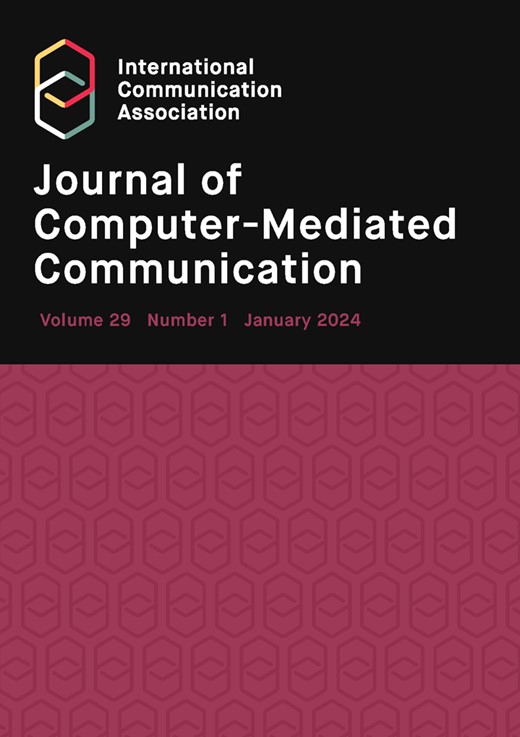A tale of two concepts: differential temporal predictions of habitual and compulsive social media use concerning connection overload and sleep quality
IF 5.7
1区 文学
Q1 COMMUNICATION
引用次数: 1
Abstract
Given how strongly social media is permeating young people’s everyday lives, many of them have formed strong habits that, under specific circumstances, can spiral out of control and bring harmful experiences. Unlike in extant literature where habitual and compulsive behaviors are often conflated, we report findings from a two-wave panel study examining the individual predictive value of both habitual and compulsive social media use on connection overload (i.e., information and communication overload) and sleep quality. Longitudinal structural equation modeling reveals that only compulsive social media use is related to enhanced feelings of connection overload and to poorer sleep, whereas habitual social media use had no significant associations with either indicator over time. These differential findings highlight a conceptual imperative for future approaches to further clarify the nature of people’s media habits to prevent spurious (and potentially overpathologizing) conclusions.这是一个关于两个概念的故事:关于连接过载和睡眠质量的习惯性和强迫性社交媒体使用的差异时间预测
鉴于社交媒体在年轻人的日常生活中渗透得如此之深,他们中的许多人已经形成了强烈的习惯,在特定情况下,这些习惯可能会失控,带来有害的体验。与现有文献中习惯性和强迫性行为经常混为一谈的情况不同,我们报告了一项两波小组研究的结果,该研究检验了习惯性和强迫性社交媒体使用对连接过载(即信息和通信过载)和睡眠质量的个人预测价值。纵向结构方程模型显示,只有强迫性的社交媒体使用与增强的连接超负荷感和较差的睡眠有关,而习惯性的社交媒体使用与这两个指标都没有显著的联系。这些不同的发现强调了未来方法在概念上的必要性,即进一步澄清人们媒体习惯的本质,以防止虚假(和潜在的过度病态)结论。
本文章由计算机程序翻译,如有差异,请以英文原文为准。
求助全文
约1分钟内获得全文
求助全文
来源期刊
CiteScore
9.60
自引率
2.80%
发文量
26
期刊介绍:
The Journal of Computer-Mediated Communication (JCMC) has been a longstanding contributor to the field of computer-mediated communication research. Since its inception in 1995, it has been a pioneer in web-based, peer-reviewed scholarly publications. JCMC encourages interdisciplinary research, welcoming contributions from various disciplines, such as communication, business, education, political science, sociology, psychology, media studies, and information science. The journal's commitment to open access and high-quality standards has solidified its status as a reputable source for scholars exploring the dynamics of communication in the digital age.

 求助内容:
求助内容: 应助结果提醒方式:
应助结果提醒方式:


